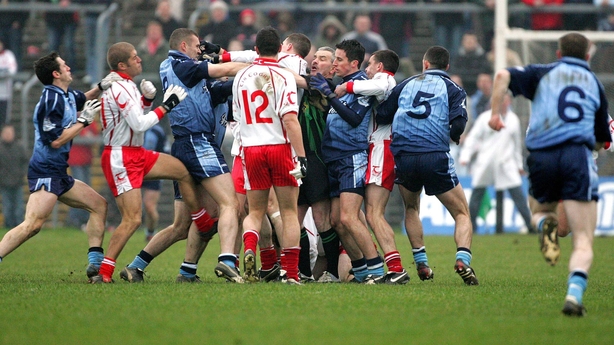Ciarán Whelan believes the latest case of players escaping suspensions shows there is "a fundamental problem" with the enforcement of rules in Gaelic games.
Armagh's Stefan Campbell and Aidan Nugent are free to play in Sunday's Ulster SFC quarter-final against Donegal after the Central Appeals Committee this week overturned suspensions proposed by the Central Competitions Control Committee and upheld by the Central Hearings Committee.
The suspensions were reportedly dismissed on the grounds that not enough detail had been submitted to prove the players had 'contributed to a melee' in an Allianz Football League match against Donegal in March. The rulebook does not specify how or if a referee is expected to back up their assertion.
Even if the players had failed to win at the CAC, they could have taken their case to the fourth and final level of the GAA's many-layered disciplinary process, the independent Disputes Resolution Authority. Their team-mate Ciarán Mackin accepted a one-match ban and will miss the game.
Speaking on the RTÉ GAA podcast, former Dublin star Whelan said: "In other sports, this just doesn't arise. If someone gets suspended they’re suspended, it’s end of story.
"You’ve got to wonder if there is a fundamental problem with the rulebook and how we implement the rules.
"There are so many avenues to pursue a technicality because the whole disciplinary system is so complex. The whole rulebook is so open to interpretation and challenge."
Whelan also recalled his own personal experience of getting off the hook in the boardroom.
Following a melee at an Allianz Football League game in February 2006, nine players (five from Dublin and four from Tyrone) were given proposed bans but all were cleared on appeal.
"Going back to the 'Battle of Omagh’, we were cited by video," Whelan said.
"Suspensions were brought forward by the CCCC [but] once the legal people get involved in it they are looking to expose a technicality.
"I think it was the CAC we went to to make the appeal. We were advised, and it was trying to trip [up] the GAA in terms of process.
"There was a rule to say that the CCCC could not interfere with the CAC process. We went in to the CAC and asked them where I brought the game into disrepute. In order to point that out they had to bring in a member of the CCCC, who originally brought the charges. Straight away we had a breach of technicality. Case gone and everyone got off on the same basis.
"I know the DRA was brought in to try and stop people from going to the high court.
"The GAA want to clamp down [on melees] and are asking referees but the reality is a high percentage of lads will get off on a technicality because the process is so complex. Legal people will tie amateur people in knots."

Whelan chose not to pursue an appeal and accepted an eight-week ban after another brawl between Dublin and Meath in 2008.
"I remember saying to Pillar [Caffrey], ‘I’m not going down this route again’. We were guilty. It would be very hard to defend trying to get off."
While expressing relief that some of Armagh’s main men will be able to face Donegal, Orchard County great Steven McDonnell told 2fm’s Game On said the disciplinary system "definitely has to be looked at".
"As far back as when I was playing in the mid-noughties there were a few high-profile incidences where players were getting suspensions overturned."
McDonnell believes a second ref could also help with more accurate decisions on the field.
"Some support has to be offered referees as well. Why not trial a second referee, one in each half? It works efficiently in the international rules.
"What we are expect now from 30 players in terms of the quality of performance, it’s hard for one person in the middle of the park to officiate all of that."


